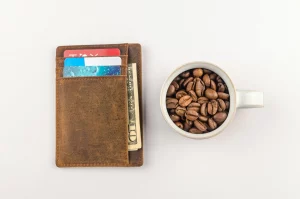Credit cards are one of the most common financial products used by Americans over the age of 18. It is estimated that, as of the end of 2021, 70% of the United States adult population carries a credit card, with 34% of Americans carrying 3 or more cards themselves.
As a tool to enhance financial flexibility, credit cards can be invaluable, but it is important to understand how to use them properly so as not to fall into any sort of financial trouble.
Paying for items with credit is convenient, it’s generally safer than using cash or debit, and it can be highly rewarding. Plus, if you’re using your cards responsibly, you could be building a solid credit score.
What is a Credit Card?
A credit card is essentially a fast and simple way to borrow money that you can then pay back more or less as you please. Generally speaking, the longer you take to pay it back, the more you’ll actually be paying due to interest, but the option for flexibility is there should you need it.
Once you’ve received your credit card, you don’t need to keep re-applying every time you want to borrow money. Rather, you can simply spend the credit as though it were your own money and pay it back as soon as is possible.
Credit cards therefore free you up from having to save in preparation for any big purchases you want to make and instead allow you to buy what you want and pay off the balance steadily over time.
How to Use a Credit Card Effectively
Set a budget
When you pay for everything with cash, it can be easy to see how much you’re spending as those tens and twenties disappear from your wallet. Tracking how much you put on a credit card isn’t as simple, especially if you’re just getting started with credit.
Many credit card issuers, however, allow you to set up balance alerts — notifications that let you know by text, email or in-app message that your balance is approaching a certain level that you’ve set. You could set an alert for when your balance approaches, say, $1000, or for an amount that equals 25% of your credit limit.
Earn whilst you spend
Several credit card companies offer reward points or cashback if the card is swiped to pay utility bills, restaurant bills, movie ticket purchases, and more. Some card issuers tie-up with retail chains for cashback arrangements.
You can actually earn by spending through your credit card by keeping a track of deals like these. Earned reward points can be redeemed against gifts on the company’s reward catalogue – reward points can fetch you anything from something as basic as a gift voucher to something as huge as a car.
Set-up automatic payments
It can take time to get used to paying a bill each month. Protect yourself from late credit card bills by scheduling automatic payments ahead of your due date.
Be sure the scheduled payment is more than the minimum payment—ideally, for your full balance—and that you have enough funds in your checking account before the payment is scheduled. Otherwise, you may be charged a late fee or a returned payment fee.
Paying on time is also important because payment history is the biggest contributor to your credit score, the three-digit number that lenders use to evaluate your credit usage. Aim to pay every single credit card bill on time to keep your score strong.
What is the Best Age to Get a Credit Card
Is there a minimum age requirement?
Your age is an important factor in knowing whether you should even bother to apply for a credit card. To sign a contract—which you’ll do when you apply for your own credit account—you have to be at least 18 years old.
If you’re between the ages of 18 and 21, obtaining an unsecured credit card by yourself can be a challenge. You’ll have to submit proof that you have the independent means to manage the minimum payment. So if getting a card in your own name is your goal and you have a steady job that satisfies the income requirement, you’re free to do it.
Credit Card Act of 2009
Another legal hurdle to get through is the Credit Card Accountability, Responsibility and Disclosure Act of 2009, or Credit CARD Act.
It was enacted as a protective measure against the very real problem of young adults getting in over their heads with credit cards. Before this law, college campuses had been thick with credit card company representatives incentivising students in exchange for completed applications.
What if you’re not earning enough to make the repayments?
If you don’t have the means to pay for the debt you could incur with the card, an option is to ask someone with a good credit rating and sufficient income to cosign the application.
Not all credit card issuers will allow two people to be on an account, but if you find one that does, you and the cosigner will be equally liable for any debt, and the account will appear on both of your credit reports.

